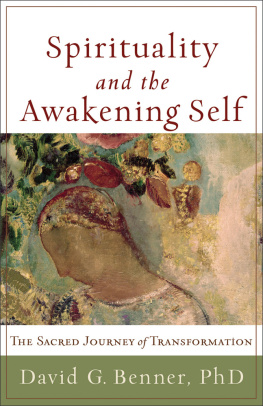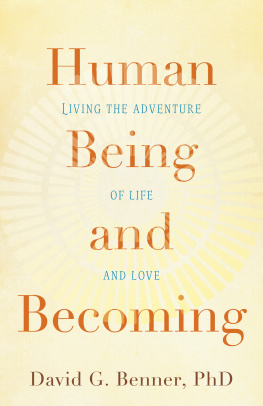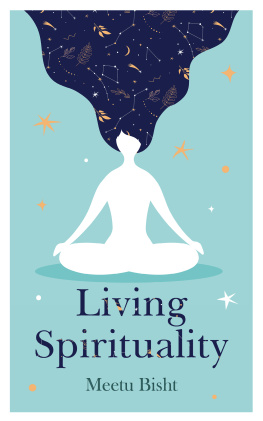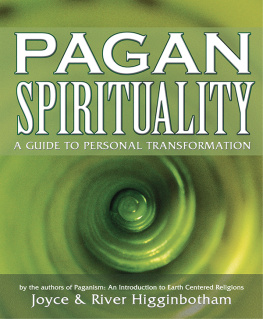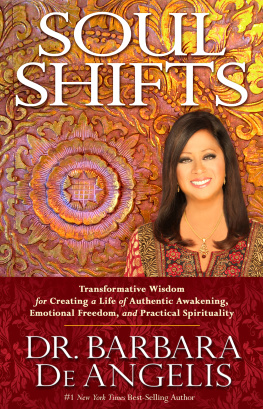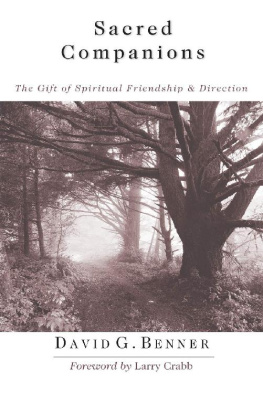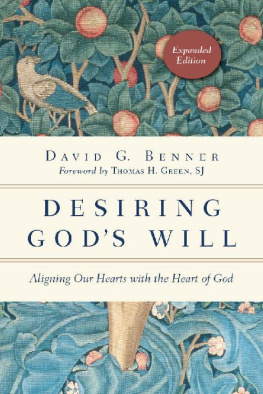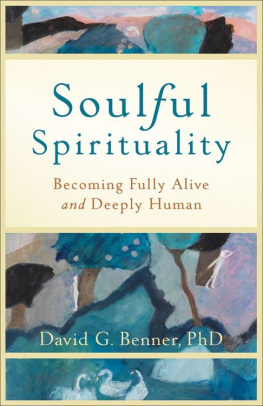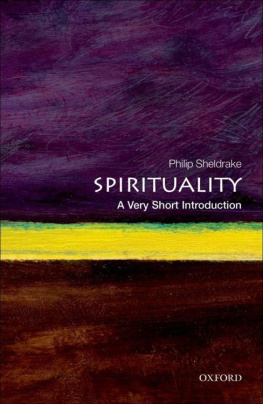David G. PhD Benner - Spirituality and the Awakening Self: The Sacred Journey of Transformation
Here you can read online David G. PhD Benner - Spirituality and the Awakening Self: The Sacred Journey of Transformation full text of the book (entire story) in english for free. Download pdf and epub, get meaning, cover and reviews about this ebook. year: 2012, publisher: Baker Publishing Group, genre: Religion. Description of the work, (preface) as well as reviews are available. Best literature library LitArk.com created for fans of good reading and offers a wide selection of genres:
Romance novel
Science fiction
Adventure
Detective
Science
History
Home and family
Prose
Art
Politics
Computer
Non-fiction
Religion
Business
Children
Humor
Choose a favorite category and find really read worthwhile books. Enjoy immersion in the world of imagination, feel the emotions of the characters or learn something new for yourself, make an fascinating discovery.
- Book:Spirituality and the Awakening Self: The Sacred Journey of Transformation
- Author:
- Publisher:Baker Publishing Group
- Genre:
- Year:2012
- Rating:5 / 5
- Favourites:Add to favourites
- Your mark:
- 100
- 1
- 2
- 3
- 4
- 5
Spirituality and the Awakening Self: The Sacred Journey of Transformation: summary, description and annotation
We offer to read an annotation, description, summary or preface (depends on what the author of the book "Spirituality and the Awakening Self: The Sacred Journey of Transformation" wrote himself). If you haven't found the necessary information about the book — write in the comments, we will try to find it.
Spirituality and the Awakening Self: The Sacred Journey of Transformation — read online for free the complete book (whole text) full work
Below is the text of the book, divided by pages. System saving the place of the last page read, allows you to conveniently read the book "Spirituality and the Awakening Self: The Sacred Journey of Transformation" online for free, without having to search again every time where you left off. Put a bookmark, and you can go to the page where you finished reading at any time.
Font size:
Interval:
Bookmark:

To Ed Plantinga,
for helping me stay awake

The Journey of Human Becoming
B eing human is a journey of becoming. At birth we humans are not yet what we have the capacity to fully become. Newborns may contain the possibilities for mature personhood, but they do not show any of the characteristics that psychologists have identified as markers of fully actualized humanity. Never present in childhood are such things as the capacity for nonpossessive love, a spirituality that makes life meaningful and suffering sufferable, and an identification with all humans, not simply those of ones own tribe. Many other things could be specified and will be identified as we proceed, but even this partial list shows the magnitude of the task of achieving full-orbed personhood.
Although the journey of human becoming is lifelong, it is not simply a result of the passage of time. Time is necessary but not sufficient. Maturation may make human actualization possible, but full personhood comes only from a lifelong journey of becoming that, as we shall see, must be lived in a posture of openness, trust, willingness, and surrender.
Glimpses of the Evolving Self
Watch as the young child learns to trust that her mother is still there even though she may be out of sight. Piaget called this developmental accomplishment the achievement of object constancy. It is a moment to celebrate, and parents usually do. But then watch as the cognitive skills of this same little girl continue to develop, and notice now how she suddenly seems secure within a first-person perspective on her world. She speaks as an I and organizes her experience around this I. The result is something that we could call an egocentric perspective on the world: this is a tremendously important moment of human becoming.
But the journey is far from overeven if we continue to follow just this single line of cognitive development and the way in which it provides a perspective from which the person views and relates to the world. Notice how a few years later she has hopefully added a second-person perspective to this egocentric way of relating to that which is beyond her own self. What we might call a sociocentric worldview now allows her to see things from the perspectives of others. A developing capacity for empathy allows her to adopt an alternate perspective and no longer be limited to the first-person point of view that earlier was such a developmental triumph.
The subsequent development of the capacity for reason ushers in another stage as, in adolescence, she now adds third-person perspectives and is capable of adopting a more truly world-centric orientation to that which is beyond her. And because we can only identify with what we can see in relationship to self, she is now able to feel herself to be integrally connected to the world, not just to her social or religious group or to her family or herself. Through this process her self is unfolding. The same is true for all of us. By a sequence of ever-expanding identifications, we become what we identify with, and if we trust the flow of this process, our small self becomes a larger and truer self.
There are other important steps in this cognitive and perspective-taking line, and many other important lines of development also shape the journey of the developing self. But let us look at just one more image from later in the journey of this hypothetical young woman. Suppose that she remains open to life and that this openness includes openness toward God. It may well be that when we next look into her life, we recognize something that others around her may not see, or at least not understand. They may notice her equanimity and nonjudgmental openness, and they may even describe her as a very spiritual woman. But if we take the time to get to know her, we may begin to notice how deeply her identity and consciousness are grounded in her relationship to God. Yet relationship may not be exactly the right word because she might talk more of an abiding sense of being in God and Gods being in her. She might also talk about this leading to a sense of being at one within herself and within God. Although we may not understand exactly what she means, we might begin to suspect that she is something of a mystic. In response to this suggestion, she might laugh and say that she is no mystic. But when asked more about her life, she might tell you, as the woman I am thinking about recently told me, Its true: there is nothing I want more than to know God deeply. But its also true that I am less and less clear about where the boundaries between God and meor God and anyonebegin or end. Increasingly I see God in all people and all thingsnot contained in any of these people or things but expressed in and through them all. And increasingly I feel one with God and one with lifereally, one with all that is.
This journey into a deeper consciousness of our being in God will be our focus in this book. We can describe it as a journey of the evolving or unfolding self because the self that begins this journey is never the self that ends it. But we could also call it a journey of an awakening self because awakening is the central dynamic of the unfolding and evolving. The self that emerges during this journey is larger, more enlightened, and more whole. This journey is one that all humans are invited to make. It is the journey that defines our humanity, for it is a journey toward our source and toward our fulfillment. It is a journey into what Christian theology has traditionally described as union with God.
A Theology of Becoming
The source and ground of all existence lies in the constantly outpouring life of God. Moment by moment all creation is sustained by God. Creation is not just something that happened in the past. Though there may have been a beginning point, it was the beginning of an active relationship that never stopsa relationship that exists between God and every person and thing that exists. If this relationship were suddenly to stop, we and everything else that is would instantly cease to exist.
But it is not just all being that is grounded in God: so too is all becoming. The universe is a place of creativity, becoming, and transformation because these are fundamental properties of the God who sustains it. All things are not only sustained by God; but all things are also being made new in Christ. All things are being liberated and restoredbecoming more than they are, becoming all they were intended to be in their fullness in Christ.
The Spirit of Godthe source of all generativity, all creativity, and all lifeinvites us to participate in the grand adventure of human becoming. Openness to becoming is openness to God. This is why the Christian mystics have so much to teach us. They show us that longing for the fullness of God demands openness to a radical form of transformation that we cannot control. It is something we can neither engineer nor accomplish. But it is something we can experience.
It is, however, alarmingly easy to fail to discern the ever-present nudges of the Spirit to become all we are meant to be. The culture of family and society and the rhythms of our lives lull us into a sleep of complacency within the small, safe places we have arranged for ourselves. Seekers settle for being finders, even when what is found is so much less than what their spirits call them toward. Being and becoming are both routinely sacrificed on the altar of doing. The gentle but persistent heartbeat of our deep longings to find our true place in God is gradually drowned out by the cacophony of superficial desires, and we are left with a small ego-self rather than an awakening self that is ever becoming in the Spirit.
Font size:
Interval:
Bookmark:
Similar books «Spirituality and the Awakening Self: The Sacred Journey of Transformation»
Look at similar books to Spirituality and the Awakening Self: The Sacred Journey of Transformation. We have selected literature similar in name and meaning in the hope of providing readers with more options to find new, interesting, not yet read works.
Discussion, reviews of the book Spirituality and the Awakening Self: The Sacred Journey of Transformation and just readers' own opinions. Leave your comments, write what you think about the work, its meaning or the main characters. Specify what exactly you liked and what you didn't like, and why you think so.

